Operator overloading
- 1. Mrs. Pranali P. Chaudhari Operator Overloading
- 2. Contents Operator Overloading Overloading Unary and Binary Operator Overloading using friend function Type casting andType conversion
- 3. Quiz 1 What is Operator Overloading? Operator overloading is a specific case of polymorphism in which some or all operators like +, = or == are treated as polymorphic functions and as such have different behaviours depending on the types of its arguments.
- 4. Operator Overloading Operator overloading is a specific case of polymorphism in which some or all of operators like +, =, or == have different implementations depending on the types of their arguments. Operator overloading gives us the opportunity to redefine the C++ language. C++ permits us to add two variables of user defined types with the same syntax that is applied to the basic data types.
- 5. Restrictions on Operator Overloading Overloading restrictions Precedence of an operator cannot be changed Associatively of an operator cannot be changed Arity (number of operands) cannot be changed Unary operators remain unary, and binary operators remain binary Operators &, *, + and - each have unary and binary versions Unary and binary versions can be overloaded separately No new operators can be created Use only existing operators No overloading operators for built-in types Cannot change how two integers are added Produces a syntax error
- 6. Restrictions on Operator Overloading Following operators can’t be overloaded: Class member access operators (., .*) Scope resolution operator (::) Size operator (sizeof ) Conditional operator (?:) All other operators can be overload
- 7. Defining Operator Overloading General syntax for operator overloading is: return type classname :: operator op(arglist) { Function body } For e.g.: vector operator +(vector); vector is a data type of class.
- 8. Operator Overloading Process The process of overloading involves the following steps: Create a class that defines the data type that is to be used in the overloading operation. Declare the operator function operator op() in the public part of the class. Define the operator function to implement the required operations.
- 9. Overloading Unary Operators Consider unary minus operator (changes the sign of the operand) The unary minus when applied to an object should change the sign of each of its data items.
- 10. Overloading Unary Operators class space { int x, y, z; public: void getdata( int a, int b, int c); void display(void); void operator - (); // overload unary minus operator };
- 11. Overloading Unary Operators void space :: getdata(int a, int b, int c) { x = a; y = b; z = c; } void space :: display(void) { cout << x ; cout << y ; cout << z ; }
- 12. Overloading Unary Operators void space :: operator - () { x = -x; y = -y; z = -z; } int main() { space S; S.getdata(10, 20, 30); S.display(); -S; // activates operator-() function S.display(); return 0; }
- 13. Practice Statement 1 Create a class date with day, month and year as its members. Accept the date from the user and display it. Overload the increment and decrement operators for displaying the next and previous date for the given date.
- 14. Overloading Binary Operators As a unary operator is overloaded we can also overload a binary operator. For e.g: A binary operator + can be overloaded to add two objects rather than adding two variables. Using operator overloading a functional notation, C = sum(A, B); Can be replaced by, C = A + B;
- 15. Overloading Binary Operators class complex { float x; float y; public: complex(){} complex(float real, float imag) { x = real; y = imag; } complex operator + (complex); void display(void); };
- 16. Overloading Binary Operators complex complex :: operator + (complex c) { complex temp; temp.x = x + c.x; temp.y = y + c.y; return (temp); } void complex :: display(void) { cout << x << “ + j “ << y ; }
- 17. Overloading Binary Operators int main() { complex C1, C2, C3; C1 = complex(2.5, 3.5); C2 = complex(1.6, 2.7); C3 = C1 + C2; // invokes operator+() function cout << “ C1 = “; C1.display(); cout << “ C2 = “; C2.display(); cout << “ C3 = “; C3.display(); return 0; }
- 18. Overloading binary operators using Friends Friend functions may be used in place of member functions for overloading a binary operator. A friend function requires two arguments to be explicitly passed to it, while a member function requires only one. For e.g: complex operator + (complex); friend complex operator + (complex, complex);
- 19. Overloading binary operators using Friends The operator function definition would also be modified as: complex complex :: operator+(complex c) { complex temp; temp.x = x + c.x; temp.y = y + c.y; return(temp); } complex operator + (complex a, complex b) { return complex((a.x + b.x), (a.y + b.y)); }
- 20. Overloading binary operators using Friends The statement, C3 = C1 + C2; Is equivalent to C3 = operator+(C1, C2);
- 21. String Manipulations using friends class string { char *p; int len; public: string() { len = 0; p = 0;} string( const char * s ); string ( const string & s ); ~ string () { delete p; } friend string operator+(const string & s , const string & t ); friend int operator<=(const string & s, const string & t ); friend void show( const string s); };
- 22. String Manipulations using friends string :: string ( const char * s) { len = strlen(s); p = new char[len + 1]; strcpy(p, s); } string :: string (const string & s) { len = s. len; p = new char[len+1]; strcpy(p, s.p); }
- 23. String Manipulations using friends String operator+(const string &s, const string &t) { string temp; temp.len = s.len + t.len; temp.p = new char[temp.len+1]; strcpy(temp.p, s.p); strcat(temp.p, t.p); return(temp); }
- 24. String Manipulations using friends int operator<=(const string &s , const string &t) { int m = strlen(s.p); int n = strlen(t.p); if( m <= n) return(1); else return (0); } void show (const string s) { cout << s.p; }
- 25. String Manipulations using friends int main() { string s1 = “New”; string s2 = “York”; string s3 = “Delhi”; string t1, t2, t3; t1 = s1; t2 = s2; t3 = s1 + s3; show(t1); show(t2); show(t3);
- 26. String Manipulations using friends if ( t1 <= t3) { show(t1); cout << “smaller than”; show(t3); } else { show(t3); cout << “smaller than”; show(t1); } return 0; }
- 27. Overloading Stream Insertion and Extraction Operators It is possible to overload the stream insertion (<<) and extraction operators (>>) to work with classes. This has advantages, in that It makes programs more readable It makes programs more extensible It makes input and output more consistent
- 28. Overloading Stream Insertion and Extraction Operators istream & operator >> (istream &din, vector &b) { for (int i = 0; i < size; i++) { din>>b.v[i]; } return(din); }
- 29. Overloading Stream Insertion and Extraction Operators ostream & operator << (ostream &dout, rational &b) { dout<<“(“; for (int i = 0; i < size; i++) { din>>b.v[i]; } dout << “)”; return(dout); }
- 30. Practice Statement 2 Create a class rational to accept a rational number. Perform all the arithmetic operations on rational numbers by overloading all arithmetic operators ( +, - , * , / ). Also overload >> and << operators for taking rational numbers as input and display them.
- 31. Type Conversion Type conversion is a process of converting one data type to another. Type conversion is done automatically for the built-in datatypes by the compiler. Example: int m; float x = 3.14159; m = x; The above statements convert x to an integer before assigning it to m. For user defined data type the compiler has to be provided with the type conversion function.
- 32. Type Conversion There are three situations that arise when performing data type conversion between incompatible types: Conversion from basic type to class type Conversion from class type to basic type Conversion from one class type to another class type
- 33. Basic type to Class type The conversion from basic type to class type is easily accomplish by the use of constructors. Constructors are used to initialize the objects and we can use them to build a class type object from an basic type. For example we can create a vector object from an int type array. The constructors perform a defacto type conversion from the argument’s type to the constructor’s class type. The constructors used for the type conversion take a single argument whose type is to be converted.
- 34. Basic type to class type (Example) class time { int hrs; int mins; public: time (int t) // constructor { hrs = t/60; // t in minutes mins = t%60; } }; The following conversion statements can be used in a function: time t1; // object t1 created int duration = 85; t1 = duration; // int to class type
- 35. Class type to Basic type C++ allows an overloaded casting operator that could be used to convert a class type data to a basic type. General syntax: Operator typename() { ........... ........... } This function converts a class type data to typename. For example, the operator double() converts a class object to type double.
- 36. Class type to Basic type (Example) Vector :: operator double() { double sum = 0; for(int i =0; i<size; i++) { sum = sum + v[i] * v[i]; return sqrt(sum); } } This function converts a vector to the corresponding scalar magnitude. The operator double() can be used as double length = double(v1); OR double length = v1;
- 37. Class type to Basic type The casting operator function should satisfy the following conditions: It must be a class member. It must not specify a return type. It must not have any arguments.
- 38. One class to Another class type Conversions between objects of different classes can be carried out by either a constructor or a conversion function. Consider the statement: objX = objY; The class Y type data is converted to the class X type data and the converted value is assigned to the objX. The class Y is known as source class and class X is known as destination class.
- 39. One class to Another class type When to use constructor and type conversion function?
- 40. One class to Another class type (Example) Consider an example of an inventory of products in store. One way of recording the details of the product is to record their code number, total items in the stock and the cost of each item. Another approach is to just specify the item code and the value of the item in the stock. Example.
- 42. Summary State whetherTrue or False: Using the operator overloading concept, we can change the meaning of an operator. Friend functions cannot be used to overload operators. When using an overloaded binary operator, the left operand is implicitly passed to the member function. The overloaded operator must have atleast one operand that is user-defined type. Operator functions never return a value. Through operator overloading, a class type data can be converted to a basic type. A constructor can be used to convert a basic type to a class type data.
- 43. Short Answer Questions Why is it necessary to overload and operator? Operator overloading allows us to provide new implementations for existing operators. Using operator overloading one can perform the operation on the user defined data types in the same way as that of built-in data types. Example: Two integer values can be added as c = a + b. With the use of operator overloading the + operator can also be used to perform addition of two complex numbers as: C3 = C1 + C2 where C1, C2 and C3 are the objects of class complex.
- 44. Short Answer Questions When is a friend function compulsory? Give example. Friend function is used in a situation where we need to use two different types of operands for a binary operator. One an object and another a built-in data type. A = 2 + B Here the statement will not be executed by the member functions as the left hand operand which is responsible for invoking the member function is not the object of the same class. However the friend function allows the statement to be executed.
- 45. Short Answer Questions A friend function cannot be used to overload the assignment operator = . Explain why? In the assignment operator, the right hand operand is source and lefthand operand is the target of assignment. When we overload assignment operator as member function then the Lvalue becomes the object for which the assignment operator is called and the Rvalue object is passed as parameter. If the Rvalue is constant then by using the constructor that value can be converted into object and then will be passed as parameter to the assignment operator. But in case of friend function both the Lvalue and Rvalue needs to be passed as parameter. If the Lvalue is constant then it gets converted into the class object by constructor which results in changing the constant value which is not allowed/illegal. Hence, to avoid modifying constant as Lvalue assignment operator was restricted to be overloaded as friend function.
- 46. Short Answer Questions Name the operators that cannot be overloaded. Class member access operators (., .*) Scope resolution operator (::) Size operator (sizeof ) Conditional operator (?:) Name the operators that cannot be overloaded using friend function. Assignment operator ( = ) Function call operator ( ) Subscripting operator [ ] Class member access operator ( -> )
- 47. Short Answer Questions What is conversion function. How is it created. Explain its syntax. The conversion function is the overloaded casting operator that is used to convert a class type data to basic type data. Syntax: Operator typename() { ........... ........... } This function converts a class type data to typename. Operator int() converts a class type object to type int.
- 48. Short Answer Questions A class alpha has a constructor as follows: Alpha ( int a, double b); Can we use this constructor to convert types? No, we cannot use this constructor to convert types because when the constructors are used for the type conversion it take a single argument whose type is to be converted. In the given example the alpha constructor is having two arguments int and double.
- 49. Short Answer Questions We have two classes X and Y. If a is an object of X and b is an object of Y and we want to say a = b; what type of conversion routine should be used and where? To perform the conversion a = b we use the type casting operator function in the source class. The conversion takes place in theY class and the result is given to the X class.
- 50. References Object Oriented Programming with C++ by E. Balagurusamy.
- 51. End of unit













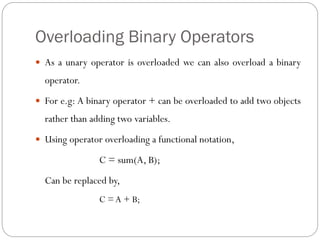







![String Manipulations using friends
string :: string ( const char * s)
{
len = strlen(s);
p = new char[len + 1];
strcpy(p, s);
}
string :: string (const string & s)
{
len = s. len;
p = new char[len+1];
strcpy(p, s.p);
}](https://image.slidesharecdn.com/operatoroverloading-171229094430/85/Operator-overloading-22-320.jpg)
![String Manipulations using friends
String operator+(const string &s, const string &t)
{
string temp;
temp.len = s.len + t.len;
temp.p = new char[temp.len+1];
strcpy(temp.p, s.p);
strcat(temp.p, t.p);
return(temp);
}](https://image.slidesharecdn.com/operatoroverloading-171229094430/85/Operator-overloading-23-320.jpg)


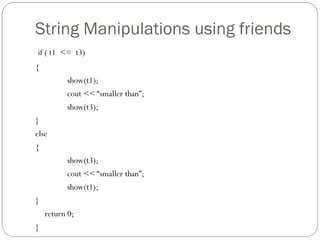

![Overloading Stream Insertion and
Extraction Operators
istream & operator >> (istream &din, vector &b)
{
for (int i = 0; i < size; i++)
{
din>>b.v[i];
}
return(din);
}](https://image.slidesharecdn.com/operatoroverloading-171229094430/85/Operator-overloading-28-320.jpg)
![Overloading Stream Insertion and
Extraction Operators
ostream & operator << (ostream &dout, rational &b)
{
dout<<“(“;
for (int i = 0; i < size; i++)
{
din>>b.v[i];
}
dout << “)”;
return(dout);
}](https://image.slidesharecdn.com/operatoroverloading-171229094430/85/Operator-overloading-29-320.jpg)

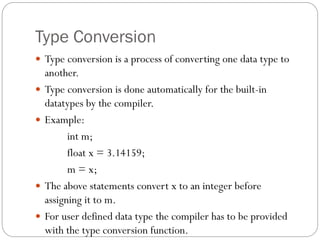


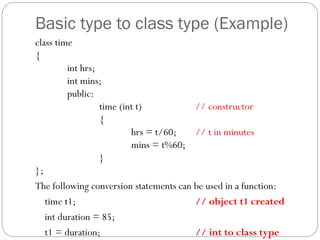

![Class type to Basic type (Example)
Vector :: operator double()
{
double sum = 0;
for(int i =0; i<size; i++)
{
sum = sum + v[i] * v[i];
return sqrt(sum);
}
}
This function converts a vector to the corresponding scalar
magnitude.
The operator double() can be used as
double length = double(v1); OR
double length = v1;](https://image.slidesharecdn.com/operatoroverloading-171229094430/85/Operator-overloading-36-320.jpg)
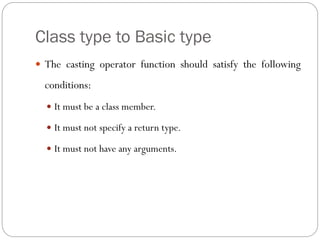





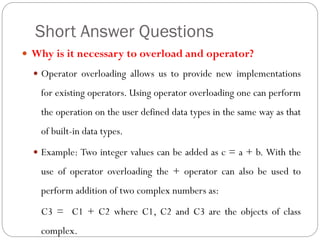


![Short Answer Questions
Name the operators that cannot be overloaded.
Class member access operators (., .*)
Scope resolution operator (::)
Size operator (sizeof )
Conditional operator (?:)
Name the operators that cannot be overloaded
using friend function.
Assignment operator ( = )
Function call operator ( )
Subscripting operator [ ]
Class member access operator ( -> )](https://image.slidesharecdn.com/operatoroverloading-171229094430/85/Operator-overloading-46-320.jpg)




